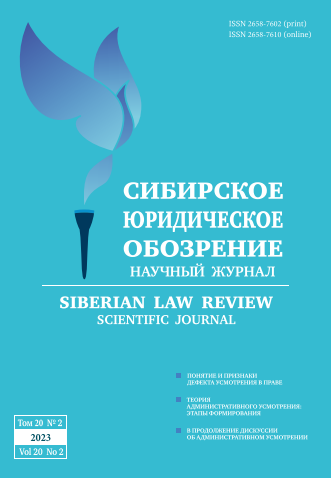On Certain Factors of Uniformity of Judicial Practice
- 作者: Borisov G.A.1
-
隶属关系:
- Kutafin Moscow State Law University
- 期: 卷 20, 编号 2 (2023)
- 页面: 120-131
- 栏目: PUBLIC LEGAL (STATE LEGAL) SCIENCES
- ##submission.datePublished##: 07.07.2023
- URL: https://journal-vniispk.ru/2658-7602/article/view/349077
- DOI: https://doi.org/10.19073/2658-7602-2023-20-2-120-131
- EDN: https://elibrary.ru/SCAHCN
- ID: 349077
如何引用文章
全文:
详细
The article presents a study of modern factors that influence the shaping of uniform judicial practice in various countries of the world. The system of ensuring legal certainty established in the Russian Federation is regarded as superior to the system of stare decisis, whose proponents not infrequently seek stability for the sake of stability. A conclusion is drawn that abstract interpretation, not tied to the particular circumstances of an individual dispute, not having a strictly obligatory nature, and issued by a collective body of the apex court leaves more room for judicial discretion and orientation on legal principles. Trends are discovered in the court structure and rules of court procedure in foreign countries, indicating the continuing competition between the two systems, as well as a search for their synthesis. An opinion is put forward that lowering judicial workload through cutting-edge technologies, including artificial intelligence, is one of the keys to increasing the quality of justice. In this regard, potential risks and benefits of introducing those technologies into court activities are considered. The example of Chinese courts is used to illustrate the danger of lending too much importance to the recommendations of AI algorithms; a suggestion is formulated to introduce a new function into the prospective “Justice Online” superservice. Particular attention is paid to such subjective factors as judicial workload and judicial well-being, their role for the work of the courts. Based on foreign research and a report presented by the UN Office on Drugs and Crime, a conclusion is made about the importance of maintaining the physical and psychological well-being of judges for ensuring the proper quality of court decisions. The importance of dialog and exchange of best practices in the sphere of judicial well-being is stressed, various problems arising as a result of turning a blind eye to this sphere are considered. In conclusion, the importance of studying the results of work of the top judicial body in ensuring uniform judicial practice is emphasized, as well as that of dissemination of information about the adopted legal standings among the general public.
作者简介
Georgii Borisov
Kutafin Moscow State Law University
编辑信件的主要联系方式.
Email: gborisov.law@yandex.ru
ORCID iD: 0000-0003-3117-1358
Applicant for a Can- didate of Science Degree at the Department of Theory of State and Law
俄罗斯联邦, 9 Sadovaya-Kudrinskaya st., Moscow, 125993参考
- Usachev A. A. Legal Certainty as the Basis of Criminal Proceedings: from Theory to Legislation Improvement. Actual Problems of Russian Law. 2021;16(8):129-140. https://doi.org/10.17803/1994-1471.2021.129.8.129-140 (In Russ.).
- Morozova L. A. Legal Definiteness as All-Legal Universal Principle of Realization of the Right. Social-Economic Phenomena and Processes. 2017;12(3):250-256. (In Russ.).
- Fenwick M., Siems M., Wrbka S. (Eds.). The Shifting Meaning of Legal Certainty in Comparative and Transnational Law. Oxford: Hart Publ.; 2017. 328 p. https://doi.org/10.5040/9781509911288
- Gadzhiev G. A. Russian Judicial Doctrine of the Rule of Law: Twenty Years Later. In: Zor’kin V. D., Barenboim P. D. (Eds.). The Legal State and the Rule of Law Doctrines in Modern World. Moscow: LUM Publ., Yustitsinform Publ.; 2013. 560 p. (In Russ.).
- Duxbury N. The Nature and Authority of Precedent. Cambridge: Cambridge University Press; 2008. 189 p. https://doi.org/10.1017/CBO9780511818684
- Rubin P. H. Why Is the Common Law Efficient? The Journal of Legal Studies. 1977;6(1):51-63. https://doi.org/10.1086/467562
- Smith A. An Inquiry into the Nature and Causes of the Wealth of Nations. Moscow: Social and Economics Literature Publ.; 1962. 684 p. (In Russ.).
- Zywicki T. J. The Rise and Fall of Efficiency in the Common Law: A Supply-Side Analysis. SSRN Electronic Journal. 2003;97. https://doi.org/10.2139/ssrn.326740
- Borisov G. A. Role of Supreme Courts in Ensuring Uniform Judicial Practice: Trends in the Post-Soviet Space. Russian Justice. 2023;4:74-81. https://doi.org/10.37399/issn2072-909X.2023.4.74-81 (In Russ.).
- Liu Qiucen. Status and the Role of Judicial Guidelines in People’s Republic of China as Precedent Law. Legal Bulletin of the Kuban State University. 2020;1:2-7. (In Russ.).
- Papagianneas S. Towards Smarter and Fairer Justice? A Review of the Chinese Scholarship on Building Smart Courts and Automating Justice. Journal of Current Chinese Affairs. 2022;51(2):327-347. https://doi.org/10.1177/18681026211021412
- Susskind R. Online Courts and the Future of Justice. New York: Oxford University Press; 2019. 347 p. https://doi.org/10.1093/oso/9780198838364.001.0001
- Cui J., Shen X., Nie F., Wang Z., Wang J., Chen Y. A Survey on Legal Judgment Prediction: Datasets, Metrics, Models and Challenges. arXiv preprint. 2022. arXiv:2204.04859. https://doi.org/10.48550/arXiv.2204.04859
- Schrever C., Hulbert C., Sourdin T. Where Stress Presides: Predictors and Correlates of Stress Among Australian Judges and Magistrates. Psychiatry, Psychology and Law. 2022;29(2):290-322. https://doi.org/10.1080/13218719.2021.1904456
- Burdina E. V., Petukhov N. A. Service Load on Judges: Problems of Definition, Evaluation, Management. Moscow: Russian State University of Justice Publ.; 2017. 236 p. (In Russ.).
- Engel C., Weinshall K. Manna from Heaven for Judges - Judges’ Reaction to a Quasi-Random Reduction in Caseload. SSRN Electronic Journal. 2020. https://doi.org/10.2139/ssrn.3521220
- Burdina E. V. Judicial Load as an Indicator of the Effectiveness of Judicial Activity: Theoretical, Methodological and Practical Aspects. Justice. 2021;3(4):177-196. https://doi.org/10.37399/2686-9241.2021.4.177-196 (In Russ.).
- Bagautdinov F. N. Flash Justice: Admissibility and Limits. Russian Judge. 2021;4:62-64. https://doi.org/10.18572/1812-3791-2021-4-62-64 (In Russ.).
补充文件












